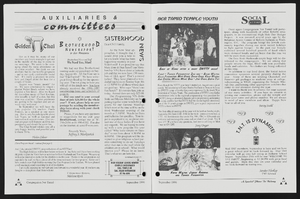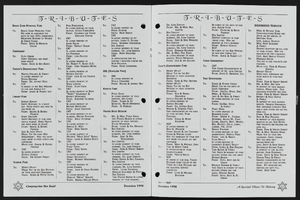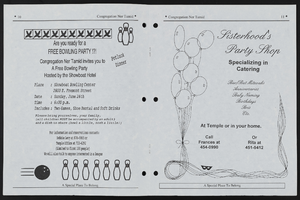Search the Special Collections and Archives Portal
Search Results

Transcript of interview with Christopher Maestas by Claytee White, September 14, 2008
Date
Archival Collection
Description
Christopher “Chris” Maestas (1965-2009) was an engaged educator and leader within the Chicano, Latinx, and Henderson communities. As he traced back his Latinx heritage, he explored his father’s hometown in Llaves, New Mexico, where he and his family were discriminated for their non-white demeanor; and his mother’s paternal Spanish roots; his grandfather came to work in Henderson, Nevada at the Basic Magnesium Industrial (BMI) plants during World War II. The Chicano and Spanish cultures played a significant part in defining his role within the community. For Chris, Chicanos were “people that lived in the southwestern United States particularly southern Colorado, New Mexico and northern Arizona that were originally Mexican citizens before the treaty (Treaty of Guadalupe Hidalgo) was signed and then after the treaty was signed they became Americans.” In this interview, he dives into the difference between Chicano and Spanish cuisine and gives his own tips on how to make Spanish chile relleno. Chris discussed what life was like in Henderson living in Henderson Camp when his grandfather emigrated from Spain in 1943. He described the evolution of the Henderson community in the 50s through his parents’ experiences living in the Hispanic communities of Victory Village and Carver Park. During his childhood in the early 70s, Chris recalled living in Henderson when it was known as Basic and living in a small town-site house. One of his most special recollections was from the summer of 1980, when his family purchased their first set of air-conditioning units. As a passionate teacher and 1984 alumnus from Basic High School, he advocated student engagement as Student Council Advisor. Chris was also an active member of the St. Peter the Apostle, Catholic Church, Knights of the Columbus group and LUPE (Latinos United for Perfect Equality) Club. The LUPE club promoted equality for the Hispanic community and family values. Chris described their Saturday picnics at BMI Park and the annual Henderson Industrial Days festival.
Text

Interview with Lewis Gibson Miller, September 14, 2005
Date
Archival Collection
Description
Text

Nicole Charlton oral history interview: transcript
Date
Archival Collection
Description
Oral history interview with Nicole Charlton conducted by Barbara Tabach on May 23, 2018 for the Remembering 1 October Oral History Project. In this interview, Charlton discusses her early life in Carlin, Nevada and relocating to Las Vegas, Nevada in 1990. Charlton is the Executive Secretary to the Clark County Coroner John Fudenberg and was among the first from the Coroner's office on the scene of the Route 91 shooting in Las Vegas.
Text

Transcript of interview with Betsy Fretwell by Claytee White and Stefani Evans, August 30, 2016
Date
Archival Collection
Description
Shortly before the University of Georgia granted Betsy Fretwell Master's degree in public administration in 1991, she applied for a one-year internship with Clark County, Nevada. The County hired her, but Fretwell did not complete her internship. Instead, the County promoted her, hired her full-time, and soon had her lobbying for the County's interests in Carson City. Her insistence on learning all sides of a question and communicating that knowledge to the decision makers was one of the skills that made her so valuable to Clark County administrators. In this interview, Fretwell discusses her South Carolina childhood, her affinity for the University of Georgia Bulldogs, and the path she took to occupy the office of city manager for the City of Las Vegas. She talks about her years at Clark County and a term at the City of Henderson, but she mostly focuses on her sixteen years at the City of Las Vegas, first as assistant city manager under Virginia Valentine and later as city manage
Text

Transcript of interview with Maxwell Kent "Tim" Hafen by Stefani Evans and Claytee White, September 14, 2016
Date
Archival Collection
Description
With so much emphasis put on the growth of Las Vegas and Henderson over the past thirty years, we often forget about the development of the others cities in the Valley. Expansive growth in Southern Nevada in the mid-twentieth century shows the region being one of the last bastions of agricultural existence, and Tim Hafen has been a major player in the development of the city of Pahrump. Born in St. George, Utah, and raised in Mesquite, Nevada, he graduated from Virgin Valley High School and attended Dixie College. Before the Bureau of Land Management (BLM) was called as such, his father introduced him to the working of the land through dairy and hay farming, where a young Tim decided he would never milk a cow again. His rejection of cow milking didn’t deter him from following the influence of his father after he married his wife, Eleanor, in 1951 and moved to Pahrump to become a cotton farmer. At that time, there were only 150 people in the area with a third of the population being from the Paiute tribe. Once the city was incorporated in 1964, he founded the Pahrump Valley Utility Company to get electricity to the area along with Amargosa Valley. Top crops at the time included cotton, alfalfa as well as wheat that were picked by Mexican farm laborers used under a yearlong contract with the Bracero program. vi In this interview, Hafen shares how he began his career in politics from getting called for grand jury in 1963. From 1966–1974, he was a member of the legislature, where he served two terms in the Old Capital building and held various positions such as Chairman of the State Board of Agriculture for twelve years and President of the Nevada Farm Bureau. He was speaker pro tem and Chairman of the taxation committee and decided to call it quits because of the Nixon scandal. Between 1974 and 1975 Hafen ended his political career, which he did before brothels began to come to the area later in the decade. In 1982, in the wake of the gasoline crisis, Hafen, like other Pahrump cotton farmers, could not afford to continue farming; he decided to shift from farming to development. His first development done was Cottonwoods at Hafen Ranch, which was on 160 acres of alluvial fan, non-farmable land; in 2000 he opened his second subdivision, Artesia at Hafen Ranch.
Text

Emily McKinley interview, March 1, 1981: transcript
Date
Archival Collection
Description
On March 1st, 1981, Glorialyn Gutierrez interviewed Emily McKinley (b. April 28, 1930 in Las Vegas, Nevada) about her life in the Las Vegas Valley. McKinley begins by speaking about her childhood, her siblings and her extended family. McKinley gives a variety of anecdotes about being raised in Las Vegas, her family’s economic hardships and the house she grew up in. Lastly, McKinley talks about the businesses she owned with her husband, their hardships and her time working multiple jobs.
Text




